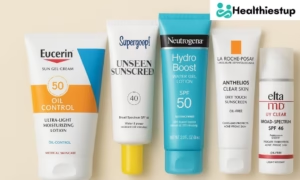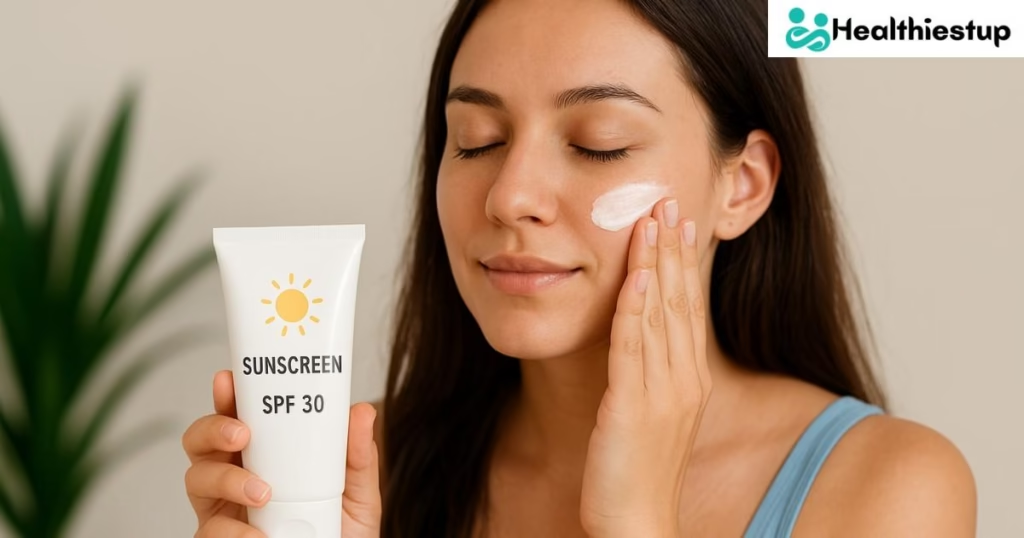Introduction
Sunscreen for Oily Skin: Maintaining clear, shine-free skin during hot, humid days can be a daily struggle especially if you have oily skin. The right sunscreen not only protects your skin from harmful UV rays but also helps control excess oil, prevent breakouts, and keep your complexion matte all day long. For people living in the U.S., where sun exposure can vary from coastal heat to dry inland climates, choosing the perfect sunscreen for oily skin is essential.
This guide covers dermatologist-approved sunscreens designed specifically for oily and acne-prone skin, explaining how to choose the right product, what ingredients to look for, and which brands are most trusted in the U.S. market.
Why Sunscreen Is Essential for Oily Skin
Sunscreen for Oily Skin: Many people with oily skin tend to skip sunscreen, fearing it might make their skin greasier or cause breakouts. However, skipping SPF can lead to long-term damage such as premature aging, sunburn, dark spots, and even skin cancer. Modern formulations are lightweight, oil-free, and non-comedogenic, meaning they won’t clog pores or add unwanted shine.
Sunscreen helps maintain skin balance by:
- Protecting against UV damage: Broad-spectrum SPF prevents UVA and UVB rays from harming skin cells.
- Preventing post-acne marks: For those prone to acne scars, sunscreen helps reduce dark spots and hyperpigmentation.
- Balancing sebum production: Some formulas contain mattifying agents that reduce excess oil throughout the day.
How to Choose the Best Sunscreen for Oily Skin
Sunscreen for Oily Skin: When shopping for sunscreen in the U.S., look for these key features on the label:
- Oil-Free and Non-Comedogenic – Ensures the product won’t clog pores or add extra grease to the skin.
- Matte Finish – Helps control shine, especially in humid climates.
- Broad-Spectrum SPF 30 or Higher – Protects against both UVA (aging) and UVB (burning) rays.
- Lightweight, Gel, or Fluid Texture – Water-based formulas absorb quickly without leaving residue.
- Dermatologist-Tested – Choose clinically tested sunscreens trusted by U.S. dermatologists.
Top Sunscreens for Oily Skin (Dermatologist-Recommended in the USA)
1. EltaMD UV Clear Broad-Spectrum SPF 46
Sunscreen for Oily Skin: A top dermatologist favorite, this sunscreen is lightweight, fragrance-free, and formulated with niacinamide to calm inflammation. Perfect for acne-prone and sensitive skin, it leaves a smooth, non-greasy finish and layers well under makeup.
Best for: Oily and acne-prone skin
Key ingredients: Zinc oxide, niacinamide, lactic acid
Price range: ~$41 (available on Amazon, Dermstore, and Ulta Beauty)
2. La Roche-Posay Anthelios Clear Skin Dry Touch Sunscreen SPF 60
Sunscreen for Oily Skin: This French pharmacy favorite is a U.S. best-seller for a reason. Its Cell-Ox Shield technology provides high UVA/UVB protection, while its dry-touch formula absorbs excess oil. It also helps prevent makeup from sliding off during the day.
Best for: Very oily or combination skin
Key ingredients: Perlite, silica, antioxidant complex
Price range: ~$38 (available at Target, CVS, Walgreens)
3. Neutrogena Hydro Boost Water Gel Lotion SPF 50
Sunscreen for Oily Skin: A lightweight, gel-based sunscreen that hydrates without making skin greasy. Infused with hyaluronic acid, it provides a cooling effect and is suitable for daily wear.
Best for: Oily to combination skin
Key ingredients: Hyaluronic acid, avobenzone, octisalate
Price range: ~$15 (available nationwide in U.S. drugstores)
4. Supergoop! Unseen Sunscreen SPF 40
Sunscreen for Oily Skin: Loved for its invisible, weightless texture, this sunscreen doubles as a primer. The oil-free formula leaves no white cast and keeps the skin matte throughout the day. It’s ideal for people who want a smooth base under makeup.
Best for: Oily and makeup-loving skin types
Key ingredients: Red algae, frankincense, meadowfoam seed extract
Price range: ~$38 (available at Sephora and Supergoop.com)
5. CeraVe Ultra-Light Moisturizing Lotion SPF 30
Sunscreen for Oily Skin: This multitasking sunscreen hydrates with ceramides and niacinamide while keeping oil under control. It’s fragrance-free, non-comedogenic, and perfect for sensitive or rosacea-prone skin.
Best for: Sensitive, oily skin
Key ingredients: Ceramides, niacinamide, zinc oxide
Price range: ~$20 (available at Walmart and Amazon USA)
6. Eucerin Oil Control Sun Gel-Cream Dry Touch SPF 50
Sunscreen for Oily Skin: An excellent choice for those with very oily or acne-prone skin. It provides high sun protection with a matte finish and a non-greasy formula that controls shine even in humid climates.
Best for: Extremely oily skin
Key ingredients: L-carnitine, glycyrrhetinic acid
Price range: ~$25 (available at Amazon and Walgreens)

|Also Read: Biotin for Hair Growth: Amazing Benefits and Effectiveness
Ingredients to Look for in Sunscreens for Oily Skin
Sunscreen for Oily Skin: When you have oily skin, the right ingredients can make all the difference. Opt for sunscreens that contain:
- Niacinamide: Balances oil and reduces inflammation.
- Silica or Perlite: Absorbs excess sebum for a matte look.
- Zinc Oxide or Titanium Dioxide: Provides physical sun protection without clogging pores.
- Hyaluronic Acid: Keeps skin hydrated without heaviness.
- L-Carnitine: Helps regulate oil production.
Avoid products that contain heavy oils, synthetic fragrances, or alcohol-based ingredients that can strip the skin and trigger excess sebum.
Tips for Applying Sunscreen on Oily Skin
- Apply after moisturizer: Use a lightweight, oil-free moisturizer first to create a balanced base.
- Use the right amount: Apply about two fingers’ worth (for face and neck) for full coverage.
- Reapply every 2–3 hours: Especially if you’re outdoors, sweating, or swimming.
- Blot before reapplication: Use blotting papers or tissue to remove excess oil.
- Finish with powder: Use a translucent powder to set your sunscreen and keep skin matte.
Common Mistakes People with Oily Skin Make with Sunscreen
- Skipping sunscreen altogether: Fear of breakouts leads many to avoid SPF, but that worsens long-term skin health.
- Using body sunscreen on face: These tend to be heavier and can clog facial pores.
- Not reapplying regularly: Even the best sunscreen won’t protect all day if not reapplied.
- Choosing too high SPF with poor texture: SPF 100 doesn’t mean better protection if the texture causes breakouts.
Dermatologist Insights
Sunscreen for Oily Skin: According to U.S. dermatologists, oily skin benefits most from mineral-based or hybrid sunscreens that combine zinc oxide with lightweight chemical filters. These provide strong protection while minimizing pore congestion. Experts also recommend pairing sunscreen with an oil-control skincare routine using gentle cleansers, niacinamide serums, and lightweight moisturizers to enhance overall effectiveness.
Conclusion
Sunscreen for Oily Skin: Finding the right sunscreen for oily skin doesn’t have to be difficult. Today’s advanced, oil-free formulations offer high protection, lightweight texture, and a natural matte finish that keeps you shine-free even in humid U.S. climates. Whether you prefer mineral or chemical sunscreen, the key is consistency apply daily, reapply regularly, and pair it with a good skincare routine.
Protecting your skin from the sun is the foundation of healthy, youthful-looking skin no matter your skin type.
FAQs
Q1. Can sunscreen cause acne on oily skin?
No, as long as you choose an oil-free, non-comedogenic sunscreen. Look for lightweight or gel-based formulas that don’t clog pores.
Q2. How often should I reapply sunscreen if I have oily skin?
Every two to three hours during daylight exposure. Use oil-blotting papers first to reduce shine before reapplying.
Q3. Should I use a separate sunscreen if my moisturizer has SPF?
Yes. Moisturizers with SPF often don’t provide full coverage or durability, especially for outdoor use.
Q4. Is matte sunscreen better for oily skin?
Absolutely. Matte-finish sunscreens help absorb oil and give a shine-free appearance throughout the day.
Q5. What’s the best SPF level for daily use?
Dermatologists in the U.S. recommend SPF 30 or higher for effective daily protection.



